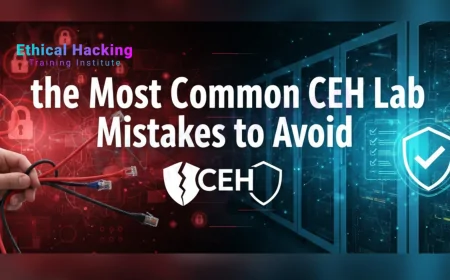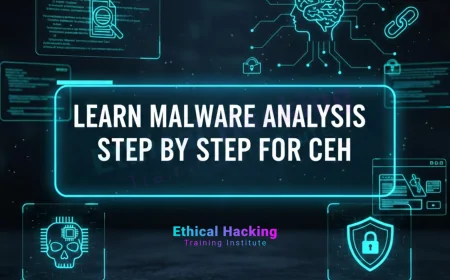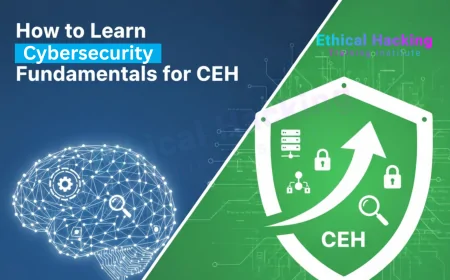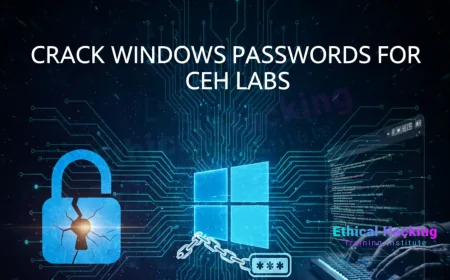Cyber Security and Hacking Courses: A Deep Dive into Network Protection and Attack Prevention | Network Security & Hacking Courses Explained: Preventing Breaches Through Expert Training
Explore the top cybersecurity and ethical hacking courses that provide real-world skills in network protection and cyber-attack prevention. Learn how these courses help secure digital infrastructures and launch careers in cybersecurity.
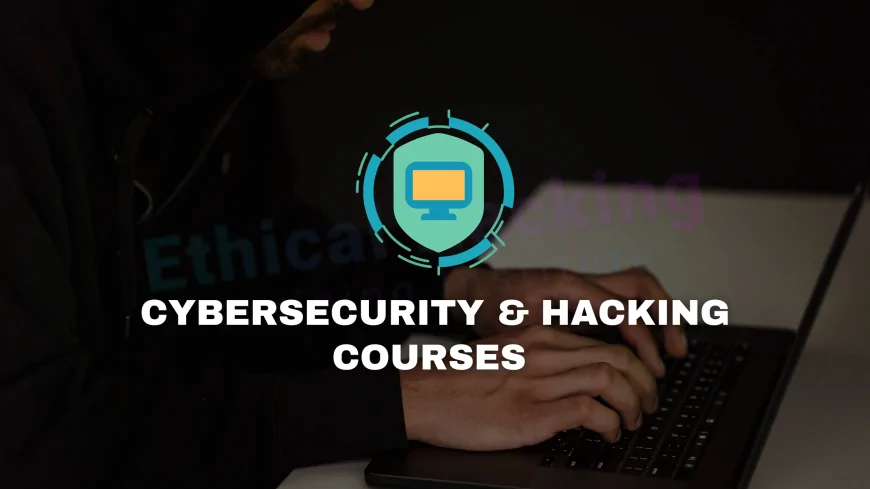
Table of Contents
- Introduction
- What is Cybersecurity?
- Understanding Hacking: Ethical vs Malicious
- Why Cybersecurity and Hacking Courses Matter
- Core Components of Cybersecurity and Hacking Courses
- Top Cybersecurity and Hacking Certifications
- Online vs Offline Cybersecurity Training
- Skills You Gain from Cybersecurity Training
- Top Tools Taught in Hacking Courses
- Career Opportunities in Cybersecurity
- Popular Hacking Specializations
- Real-World Network Protection Tactics
- Industry Demand for Ethical Hackers
- Cybersecurity in Government and Military
- Cost and ROI of Cybersecurity Courses
- Certification Validity and Renewal
- Success Stories and Case Studies
- Common Myths About Hacking Courses
- Is Cybersecurity the Right Career for You?
- FAQs
- Conclusion
Introduction
In today’s digitized world, every individual and organization is vulnerable to cyber threats. The rapid rise in cybercrime has forced industries, governments, and individuals to focus intensely on cybersecurity and ethical hacking education. From ransomware attacks to data leaks and phishing schemes, the role of trained cybersecurity professionals is now more critical than ever.
This article offers a deep dive into cybersecurity and hacking courses—highlighting how they build skills in network protection, threat detection, and cyber-attack prevention.
What is Cybersecurity?
It refers to the processes and tools used to prevent unauthorized access to digital systems and information.
-
Risk assessment
-
Firewalls & antivirus protection
-
Vulnerability scanning
-
Intrusion detection systems
-
Encryption and digital signatures
The CIA triad—confidentiality, integrity, and availability—forms the foundation of cybersecurity protections.
Understanding Hacking: Ethical vs Malicious
Not all hacking is harmful. Here’s the difference:
-
Malicious Hackers (Black Hats): Engage in illegal activities, often for personal or financial gain.
-
Ethical Hackers (White Hats): Authorized professionals who simulate attacks to find and fix vulnerabilities.
Courses in ethical hacking empower individuals to think like a hacker but act responsibly to defend digital environments.
Why Cybersecurity and Hacking Courses Matter
-
Rising cybercrime costs expected to hit $10.5 trillion annually by 2025
-
Shortage of skilled professionals (millions of unfilled roles globally)
-
Courses bridge the knowledge gap and offer job-ready skills
-
Enhance personal and corporate digital safety
Core Components of Cybersecurity and Hacking Courses
Most professional courses include:
-
Networking fundamentals (TCP/IP, DNS, HTTP)
-
Operating system security (Windows/Linux)
-
Ethical hacking techniques
-
Web application security
-
Malware analysis and incident response
-
Real-world labs and simulations
Top Cybersecurity and Hacking Certifications
| Certification | Provider | Focus Area |
|---|---|---|
| CEH | EC-Council | Ethical Hacking |
| CompTIA Security+ | CompTIA | Entry-Level Cybersecurity |
| OSCP | Offensive Security | Penetration Testing |
| CISSP | ISC² | Security Leadership |
| CISM | ISACA | Risk and Governance |
| CND | EC-Council | Network Defense |
Online vs Offline Cybersecurity Training
| Mode | Pros | Cons |
|---|---|---|
| Online | Flexible, accessible worldwide, often cheaper | Requires self-discipline |
| Offline | In-person guidance, interactive sessions | Limited to location, often costlier |
Hybrid courses offer the best of both worlds.
Skills You Gain from Cybersecurity Training
-
Vulnerability assessment
-
Penetration testing
-
Digital forensics
-
Threat intelligence
-
Network hardening
-
Social engineering awareness
These practical skills help you build a defensive mindset and execute offensive strategies.
Top Tools Taught in Hacking Courses
Courses often cover the following industry tools:
-
Kali Linux
-
Metasploit
-
Wireshark
-
Nmap
-
Burp Suite
-
John the Ripper
-
Nessus
-
Snort
Learning these tools provides hands-on experience in cybersecurity labs.
Career Opportunities in Cybersecurity
Graduates from hacking courses can become:
-
Ethical Hacker
-
Penetration Tester
-
SOC Analyst
-
Security Consultant
-
Malware Analyst
-
Security Engineer
-
Cybersecurity Architect
Popular Hacking Specializations
-
Web Application Hacking
-
Wireless Network Exploitation
-
IoT Security
-
Cloud Security
-
Reverse Engineering
-
Red Team/Blue Team Operations
Each path offers distinct career possibilities and demand.
Real-World Network Protection Tactics
Hacking courses help you implement:
-
Multi-factor authentication (MFA)
-
Secure code review
-
Endpoint protection
-
Zero Trust Architecture
-
Continuous monitoring with SIEM tools
These techniques reduce attack surfaces significantly.
Industry Demand for Ethical Hackers
The cybersecurity job market is exploding. Reports show:
-
3.5 million unfilled positions globally by 2025
-
Top salaries in India: ₹8–30 LPA
-
Global salaries: $85,000 to $200,000+
Cybersecurity in Government and Military
Many governments have dedicated Cybersecurity Response Teams (CSIRT). Ethical hackers are employed in:
-
Digital forensics
-
Cyber warfare simulation
-
Critical infrastructure protection
-
Policy advisory roles
Cost and ROI of Cybersecurity Courses
| Course Type | Cost Range (INR) | Duration |
|---|---|---|
| Short-term online | ₹10,000–₹40,000 | 1–3 months |
| Certification (CEH, CompTIA) | ₹40,000–₹90,000 | 3–6 months |
| Diploma/PG Programs | ₹80,000–₹2,00,000+ | 6–12 months |
Return on Investment (ROI) is very high, especially for certified professionals.
Certification Validity and Renewal
-
CEH: Valid for 3 years (renew via ECE points)
-
CISSP: Requires CPEs and annual maintenance fee
-
OSCP: Lifetime validity but updates recommended
Stay current with ongoing learning and re-certification.
Success Stories and Case Studies
-
A B.Tech student cracked a job at a Big 4 firm after CEH training.
-
A police officer transitioned into cybercrime forensics post-training.
-
A freelancer earns via bug bounty programs after completing OSCP.
Common Myths About Hacking Courses
-
Hacking courses teach illegal activities
These courses are legal and ethical, focused on defense. -
You need to be a coder
Basic scripting helps, but not mandatory to start. -
Only IT professionals can join
Many courses are beginner-friendly and open to all.
Is Cybersecurity the Right Career for You?
Ask yourself:
-
Do I enjoy solving problems?
-
Am I curious about how systems work?
-
Do I want a high-paying and stable career?
If yes, cybersecurity could be your ideal path.
Frequently Asked Questions (FAQs)
1. Are hacking courses legal in India?
Yes, ethical hacking courses are legal and focus on legal penetration testing and network defense.
2. Can I learn cybersecurity without a degree?
Absolutely. Many professionals build careers through certifications and hands-on experience.
3. How long does it take to become a cybersecurity expert?
It can take 6 months to 2 years, depending on your dedication and prior knowledge.
4. What is the difference between CEH and OSCP?
CEH is theory plus labs; OSCP is hands-on and exam-based with real-world hacking tasks.
5. What jobs can I get after a hacking course?
Jobs include ethical hacker, SOC analyst, penetration tester, and security consultant.
6. Is prior coding knowledge necessary?
Basic scripting knowledge is helpful but not mandatory for entry-level courses.
7. Are free cybersecurity courses worth it?
Yes, they are great for foundational learning. For jobs, pursue certification programs.
8. What is penetration testing?
Pen testing simulates cyberattacks to find vulnerabilities before attackers do.
9. Which programming languages help in cybersecurity?
Python, Bash, JavaScript, and C are commonly used.
10. What are the top tools I’ll learn?
Kali Linux, Metasploit, Nmap, Burp Suite, Wireshark, and Nessus.
11. Can non-IT professionals learn cybersecurity?
Yes, many non-technical professionals successfully enter the field with proper training.
12. What is social engineering in hacking?
It refers to manipulating people into revealing confidential information.
13. What is the salary range in India?
₹5 to ₹25 LPA depending on experience, location, and certifications.
14. Is CEH recognized globally?
Yes, CEH is recognized in over 160 countries including the U.S. Department of Defense.
15. Can I work as a freelancer after a hacking course?
Yes, many professionals do bug bounties and freelance security consulting.
16. Are cybersecurity jobs remote?
Yes, many companies offer full-time or hybrid remote cybersecurity roles.
17. Is there a future in ethical hacking?
Yes, the demand is expected to grow significantly over the next decade.
18. What is the best certification for beginners?
CompTIA Security+ or CEH is great for beginners.
19. Do cybersecurity professionals need soft skills?
Yes, communication and problem-solving are vital in teamwork and incident response.
20. Where can I take cybersecurity courses in India?
Institutes like EC-Council, Simplilearn, Great Learning, and IITs offer online and offline programs.
Conclusion
Cybersecurity and hacking courses are no longer niche—they are essential for anyone looking to safeguard digital environments or build a powerful tech career. Whether you’re a student, IT professional, or an entrepreneur, investing in cybersecurity education will future-proof your skills and open doors to exciting global opportunities. Start today, protect tomorrow.
What's Your Reaction?
 Like
0
Like
0
 Dislike
0
Dislike
0
 Love
0
Love
0
 Funny
0
Funny
0
 Angry
0
Angry
0
 Sad
0
Sad
0
 Wow
0
Wow
0






